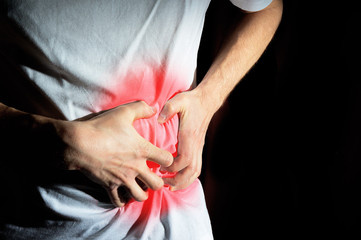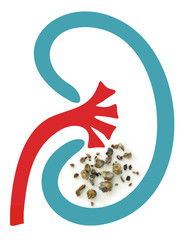KIDNEY STONES: WHAT YOU SHOULD KNOW

A
kidney stone is a hard, crystalline mineral material formed within the
kidney or urinary tract. Nephrolithiasis is the medical term for kidney
stones.
A kidney stone can be as tiny as a grain of sand, and you can pass it in your pee without ever knowing. But a bigger one can block your urine flow and hurt a lot. Some people say the pain can be worse than childbirth.
Kidney
stones have many causes and can affect any part of your urinary tract —
from your kidneys to your bladder. Often, stones form when the urine
becomes concentrated, allowing minerals to crystallize and stick
together.
Passing
kidney stones can be quite painful, but the stones usually cause no
permanent damage if they're recognized in a timely fashion. Depending on
your situation, you may need nothing more than to take pain medication
and drink lots of water to pass a kidney stone. In other instances — for
example, if stones become lodged in the urinary tract, are associated
with a urinary infection or cause complications — surgery may be needed.
Your
doctor may recommend preventive treatment to reduce your risk of
recurrent kidney stones if you're at increased risk of developing them
again.
Symptoms of kidney stone
Kidney
stones are small. They can be as tiny as a grain of salt or as big as a
corn kernel. You may not feel anything and never realize you even had
one.
But other times, you’ll know about it. That’s because flushing one out of your body as you pee can hurt, sometimes enormously.
A
kidney stone may not cause symptoms until it moves around within your
kidney or passes into your ureter — the tube connecting the kidney and
bladder. At that point, you may experience these signs and symptoms:
- Severe pain in the side and back, below the ribs
- Pain that radiates to the lower abdomen and groin
- Pain that comes in waves and fluctuates in intensity
- Pain on urination
- Pink, red or brown urine
- Cloudy or foul-smelling urine
- Nausea and vomiting
- Persistent need to urinate
- Urinating more often than usual
- Fever and chills if an infection is present
- Urinating small amounts
Pain
caused by a kidney stone may change — for instance, shifting to a
different location or increasing in intensity — as the stone moves
through your urinary tract.
Causes
lack of water in the body has being known to be the leading cause of kidney stone. When there is not enough water to dilute the uric acid, a component of urine, the urine becomes more acidic. An excessively acidic environment in urine can lead to the formation of kidney stones.When to see a doctor
Make an appointment with your doctor if you have any signs and symptoms that worry you.
Seek immediate medical attention if you experience:
- Pain so severe that you can't sit still or find a comfortable position
- Pain accompanied by nausea and vomiting
- Pain accompanied by fever and chills
- Blood in your urine
- Difficulty passing urine


No comments:
Post a Comment